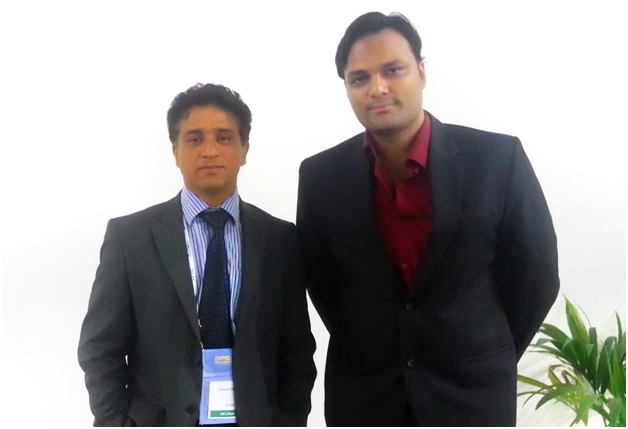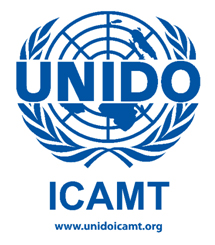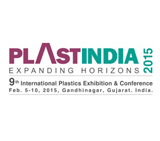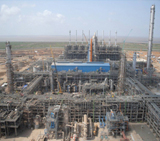Complementing Growth of Plastics Manufacturing in India:
An Interview with UNIDO ICAMT

From L to R: Mr. Deepak Ballani - Officer-in-Charge & National Programme Officer, UNIDO ICAMT;
Mr. Lekhraj Ghai -
POLYMERUPDATE
POLYMERUPDATE had the opportunity to interact with a large number of renowned delegates from the petrochemical and plastics industry who visited the 5th International Conference for Plastic Conversion (PlastiCon 2014) organized by the Gulf Petrochemicals & Chemicals Association (GPCA) at the Expo Centre, Sharjah from April 7–9, 2014. POLYMERUPDATE was the official media partner for the event as well as for Plastivision Arabia 2014, a plastics industry exhibition that brought together raw material producers and primary processing and auxiliary equipment suppliers and traders under one roof.
During the event, Mr. Deepak Ballani, Officer-in-Charge and National Programme Officer of the International Centre for Advancement of Manufacturing Technology (ICAMT), an International Technology Center of the United Nations Industrial Development Organisation (UNIDO), was kind enough to share with
POLYMERUPDATE some of his knowledge and views on the petrochemical and plastics industry.
With a well-established petrochemicals industry and a growing middle-class population, growth in the plastics industry in India is on track. However, there is still scope for improvement in terms of encouraging the development of small and medium enterprises (SMEs). Mr. Deepak Ballani speaks on how UNIDO assists sustainable development in the plastics industry in India by the empowerment of SMEs.
In an interview with POLYMERUPDATE, Mr. Ballani speaks on topics such as:
• UNIDO's contribution to the Indian plastics industry
• Its operations and selection process
• Role played by industry events such as PlastiCon and Plastivision Arabia
• Best practices and innovation and sustainability measures
• Future potential of the plastics industry
• Factors affecting growth of plastics industry in India
• Biodegradable plastics
• Plastics recycling and green technologies
Interview by Lekhraj Ghai of POLYMERUPDATE:
How does UNIDO cater to the petrochemical and plastics industry?
UNIDO stands for United Nations Industrial Development Organization. It is an autonomous body of the United Nations (UN) with the mission to promote and accelerate the process of industrialization in developing countries. The main objective of UNIDO is to assist the manufacturing industry in building capacity, enhancing competitiveness, improving delivery mechanism and upgrading manpower skills. With these policies in mind, UNIDO has been assisting the petrochemicals and plastics industry in bettering the quality of the products that are manufactured, enhancing exports and also enhancing manpower skills. UNIDO is thus serving the plastics industry since the last 4 years through an ambitious project called the National Programme for Development of Plastics Manufacturing Industry in India. This project is partly funded and supported by the Department of Chemicals and Petrochemicals (DCPC), Ministry of Chemicals and Fertilizers, and Department of Industrial Policy and Promotion (DIPP), Ministry of Commerce and Industry, Government of India. Key partners are the All India Plastics Manufacturers Association (AIPMA) and various other industry associations.
Since when has UNIDO been active in the plastics industry?
UNIDO has been active in the plastics industry for last 4 years; however, UNIDO has been active in India for more than 40 years and India is one of the founding members of UNIDO.
Is UNIDO associated with any major oil and gas, petrochemical or plastics company?
UNIDO does not associate with individual oil and gas companies. UNIDO's objective is to enhance the competitiveness of SMEs in various industrial sectors by assisting them and by replicating their best practices in other companies. Yes, UNIDO works with a few companies but only on a demonstration basis.
How many SMEs is UNIDO currently working with?
There are 100 units that have participated in the current project. These include 20 units from each of the 5 plastics clusters of Delhi NCR, Ahmedabad, Mumbai, Bhubaneswar and Chennai. UNIDO has been working with the 100 companies for last 4 years and has achieved a high level of success in terms of achieving the desired goals and envisaged objectives. We are now in the process of increasing the number of participants in this project to more than 250 companies across India.
How are these companies selected?
After a particular project is launched, UNIDO conducts a sensitization workshop to disseminate knowledge about the objectives of the programme and its benefits. Interested companies then fill a pre-assessment form with relevant information after which an expert from UNIDO visits the company and interacts with the management. The company's willingness to enroll, its growth potential and its capability to invest in new products and technology are some of the factors that are then gauged. A company's selection is also based on the feedback on the interested company by associations like AIPMA and Plastindia Foundation.
What are your expectations from GPCA PlastiCon and Plastivision Arabia 2014?
We expect our participating companies to utilize these events to expand their market and to increase their customer count. We also encourage the participating companies to take advantage of the facilities and parks provided by the countries in the Middle East for setting up manufacturing units here. Such events provide an excellent opportunity for Indian companies to expand their exports and to associate with raw material suppliers from this region for obtaining high-quality feedstock at a reasonable cost.
Does UNIDO help interested companies in striking a deal with Middle Eastern suppliers and producers?
No. Our services do not include assisting the companies in finalizing the deal; but we do provide them with a platform to explore new business opportunities. Our services include technology development, technology upgradation, quality enhancement and rendering expertise and best international practices.
Could you enlist some of the best practices and innovation and sustainability measures that are advocated by UNIDO?
UNIDO has achieved a fair amount of success in introducing several processes such as overall equipment effectiveness (OEE) and the concept of single-minute exchange of die (SMED). UNIDO's experts from the Netherlands and Germany have succeeded in helping many SMEs in the manufacture of new products, and adopting new technologies. Operator-level skills have been enhanced through structured pant-level training on plastic processing techniques, testing methods, mould making, etc. Energy efficiency measures resulting in massive savings have been introduced in companies after detailed energy audits. Companies have also been encouraged to identify, protect and commercialize their intellectual property.
What is your view on the growth of the plastics converting industry in India?
The plastics processing industry in India is highly fragmented with more than 25,000 manufacturing units of which most (70 to 80 percent) are in the small-scale sector. The total capacity of the industry to process polymers is estimated at over 5 million metric tonnes (mt) per year. In addition, approximately 2 million mt of plastics are recycled into different value-added products. Thus, the total consumption of polymers is about 10 million mt/year. Phenomenal developments in the plastic machinery sector along with the developments in the petrochemical sector have encouraged plastic processors to build capacities to service the domestic market.
The plastics sector has been exhibiting a consistent export growth rate in the past. India's plastics exports have already surpassed the USD 200 billion mark and the improved demand for Indian goods in the US, Europe and other emerging markets is likely to drive exports higher. Major plastic products exported from India include extruded goods, polyester film, raw materials, laminates, moulded/soft luggage items, writing instruments, plastic woven sacks and bags, polyvinyl chloride (PVC) leather cloth and sheeting.
The domestic plastics market, estimated at USD 8.5 billion, employs a workforce of around 3.5 million. However, India's share in global plastic exports is less than one percent, which highlights the immense potential for growth of the Indian plastics industry. Furthermore, per capita consumption of plastics in India is around 8 kg, which is far behind the 20 kg and 32 kg per capita consumption in China and the US, respectively. Also, according to India's Vision 2020, the per capita plastics consumption in India should increase to 12–20 kg. Thus, there is a tremendous potential for plastics industry growth and a need to increase the per capita consumption of plastics in the country, which needs more manufacturers, more raw material producers and upgradation of the entire value chain.
What according to you are the factors that are restraining growth in the plastics sector in India?
The mediocre technical standards of some of India's plastics products have caused imports of such products to surpass exports. India's plastics market depends on labor-intensive equipment, which has adversely impacted the productivity of plastic products despite the country being cost-effective in terms of wages. Unreliable power and high energy costs in India as compared with other Eastern Asian countries are also other constraints which are hampering capacity utilization. Indian plastics manufacturers are unable to make full use of their existing capacities because of the non-availability of power. Non-availability of high-quality raw material is also hampering growth and many Indian plastics processors are trying to procure Grade-A raw material from producers based in the Middle East.
Another important factor hampering growth of the Indian plastics industry is the recession that the automobile sector in India is facing. Due to this, there is negative demand in the auto-component industry and the entire value chain that supplies to the automobile industry has been affected, resulting in a slowdown in the engineering plastics sector.
Will UNIDO then make suggestions to the Government of India to resolve these issues? Also, does UNIDO recommend measures for the betterment of the plastics sector in India?
UNIDO does not give policy advice to the Government of India; that is not our objective. We work with SMEs to enhance their competitiveness and to help them make better-quality products. Nevertheless, the industry should start focusing more on developing cost-effective biodegradable plastics, developing sustainable polymeric materials to replace conventional commodity plastics where recycling is difficult, strengthening of plastics waste-disposal and recycling technologies and innovating measures for environment protection. In fact, it is one of UNIDO's objectives to introduce environment-friendly technologies and green manufacturing initiatives.
Which sectors of the Indian plastics industry seem most promising at this point in time?
Plastics have a huge application base; they play a role in almost every aspect of human life. The huge potential of the Indian plastics sector has encouraged Indian entrepreneurs to acquire technical expertise, achieve high quality standards and build capacities. There still lies untapped potential for plastics applications in the automobile sector, the medical sector and the aviation industry. The focus should be on increasing exports through the addition of capacity and by the manufacture of high-quality products. To summarize, the Indian plastics industry should look to appease the global market and not just the Indian plastics market.
END
For further information, commentary and interviews, please contact us on +(91-22) 61772000 and info@polymerupdate.com
ABOUT UNIDO

UNIDO is the specialized agency of the United Nations that promotes industrial development for poverty reduction, inclusive globalization and environmental sustainability.
The mandate of the United Nations Industrial Development Organization (UNIDO) is to promote and accelerate inclusive and sustainable industrial development in developing countries and economies in transition. In recent years, UNIDO has assumed an enhanced role in the global development agenda by focusing its activities on poverty reduction, inclusive
globalization and environmental sustainability. The Organization draws on four mutually reinforcing categories of services: technical cooperation, analytical and policy advisory services, standard setting and compliance, and a convening function for knowledge transfer and networking.
The Organization is recognized as a specialized and efficient provider of key services meeting the interlinked challenges of reducing poverty through productive activities, integrating developing countries in global trade through trade capacity-building, fostering environmental sustainability in industry, and improving access to clean energy.
In carrying out the core requirements of its mandate and mission, UNIDO has more than doubled its technical cooperation delivery over the past ten years. At the same time, it has also substantially increased its mobilization of financial resources, testifying to the growing international recognition of the Organization as an effective provider of inclusive and sustainable industrial development services. This increase in services has been accomplished with virtually stable staff levels and an essentially unchanged regular budget for much of the past 15 years.
ABOUT POLYMERUPDATE

POLYMERUPDATE is an online destination for the plastics and petrochemical industry, which specializes in providing market- moving information and pricing data on petrochemical products and industrial polymers. Global players seeking polymer market
intelligence rely on the real-time news and price alerts provided on
POLYMERUPDATE for making informed business-critical decisions.
POLYMERUPDATE covers a whole spectrum of products such as Crude oil, Naphtha, Aromatics, Olefins, Polyolefins and Petrochemical Intermediates. With almost two decades of extensive experience in garnering and providing business-critical content,
POLYMERUPDATE has expanded its readership to more than 60 countries in the world and its pricing methodology is considered as a benchmark across South Asia.
POLYMERUPDATE interviews and articles are a rich source of information on the latest trends in the chemical and petrochemical industry.
Visit POLYMERUPDATE on the internet at www.POLYMERUPDATE.com
Sign up for our newsletters
More like this

Huntsman speaks with POLYMERUPDATE on its Polyurethanes Business and its Contributions to the Indian Plastics Industry Read More

ONGC Chairman Sudhir Vasudeva inaugurates Oil & Gas World Expo 2014 – A POLYMERUPDATE Report Read More

PIF launches Plastindia 2015 amid much fanfare Read More

The Uncertain Case of OPaL Read More

Surge in American oil production – A problem of plenty for USA; a major challenge for others Read More



